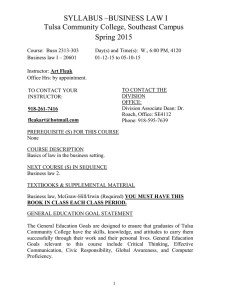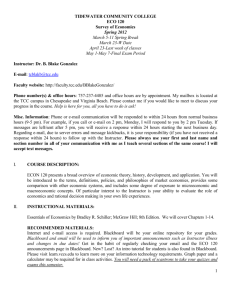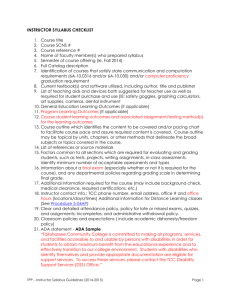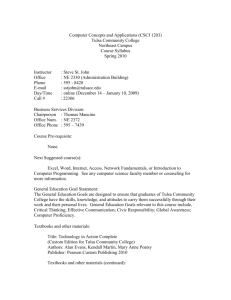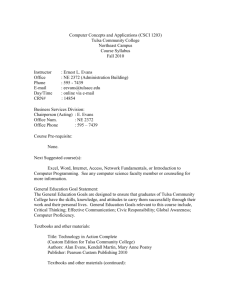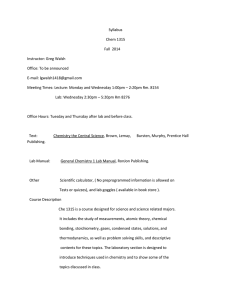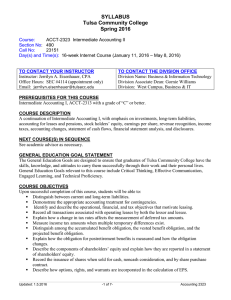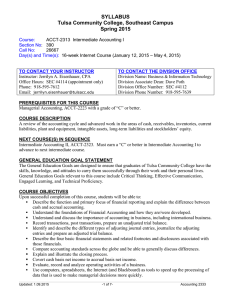ACCT_2313_490_18307_201610 - Blackboard Learn
advertisement
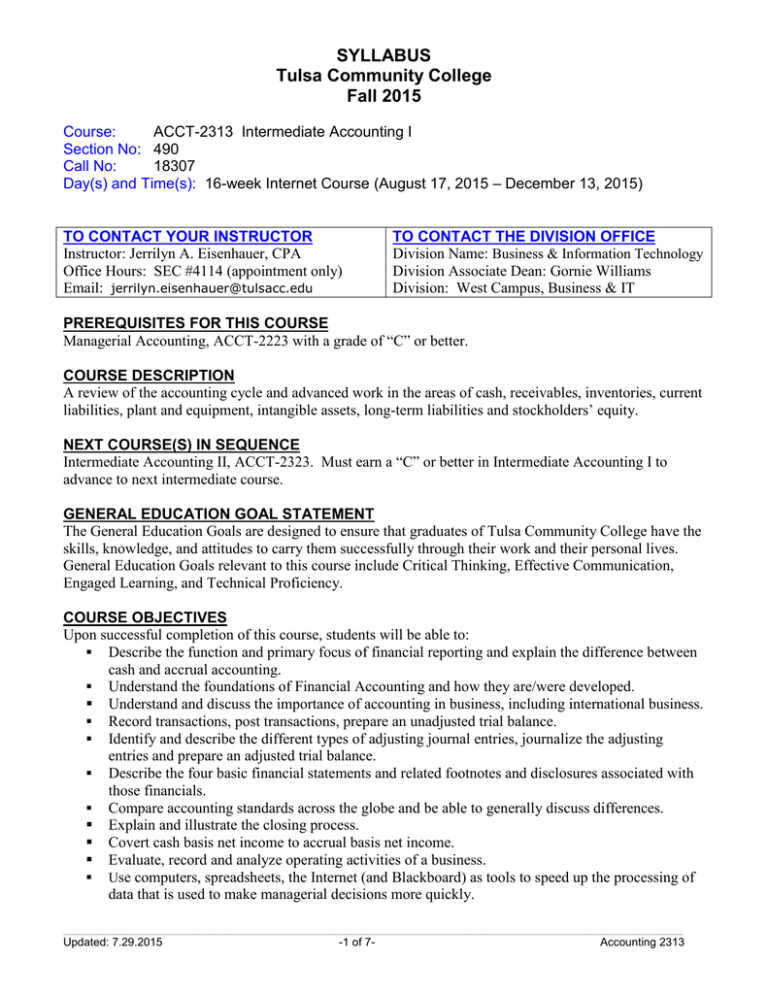
SYLLABUS Tulsa Community College Fall 2015 Course: ACCT-2313 Intermediate Accounting I Section No: 490 Call No: 18307 Day(s) and Time(s): 16-week Internet Course (August 17, 2015 – December 13, 2015) TO CONTACT YOUR INSTRUCTOR Instructor: Jerrilyn A. Eisenhauer, CPA Office Hours: SEC #4114 (appointment only) Email: jerrilyn.eisenhauer@tulsacc.edu TO CONTACT THE DIVISION OFFICE Division Name: Business & Information Technology Division Associate Dean: Gornie Williams Division: West Campus, Business & IT PREREQUISITES FOR THIS COURSE Managerial Accounting, ACCT-2223 with a grade of “C” or better. COURSE DESCRIPTION A review of the accounting cycle and advanced work in the areas of cash, receivables, inventories, current liabilities, plant and equipment, intangible assets, long-term liabilities and stockholders’ equity. NEXT COURSE(S) IN SEQUENCE Intermediate Accounting II, ACCT-2323. Must earn a “C” or better in Intermediate Accounting I to advance to next intermediate course. GENERAL EDUCATION GOAL STATEMENT The General Education Goals are designed to ensure that graduates of Tulsa Community College have the skills, knowledge, and attitudes to carry them successfully through their work and their personal lives. General Education Goals relevant to this course include Critical Thinking, Effective Communication, Engaged Learning, and Technical Proficiency. COURSE OBJECTIVES Upon successful completion of this course, students will be able to: Describe the function and primary focus of financial reporting and explain the difference between cash and accrual accounting. Understand the foundations of Financial Accounting and how they are/were developed. Understand and discuss the importance of accounting in business, including international business. Record transactions, post transactions, prepare an unadjusted trial balance. Identify and describe the different types of adjusting journal entries, journalize the adjusting entries and prepare an adjusted trial balance. Describe the four basic financial statements and related footnotes and disclosures associated with those financials. Compare accounting standards across the globe and be able to generally discuss differences. Explain and illustrate the closing process. Covert cash basis net income to accrual basis net income. Evaluate, record and analyze operating activities of a business. Use computers, spreadsheets, the Internet (and Blackboard) as tools to speed up the processing of data that is used to make managerial decisions more quickly. ____________________________________________________________________________________________________________________________________________________________________________________________________ Updated: 7.29.2015 -1 of 7- Accounting 2313 TEXTBOOKS, SOFTWARE, & SUPPLEMENTAL MATERIAL Required Textbook: INTERMEDIATE ACCOUNTING, 8th Edition, by Spiceland, et al. With your purchase of your textbook from the bookstore, you will receive an access code that will enable you to create an account with McGraw-Hill for “CONNECT.” If you purchase the textbook from another source, please note that you will need the online access code, which may or may not be included with the text you purchase. In this course you will need access to the Internet to access the TCC Blackboard program and to complete assignments at http://www.mcgrawhillconnect.com/. "Excel" and “Word” programs will assist you, if you choose to prepare your homework electronically. Required Email Address: All TCC students receive a designated “TCC” email address. All communications to you about TCC and course assignments will be sent to your TCC email address; and you must use TCC email to send email to, and receive email from, the instructor regarding this course. Other RECOMMENDED Items: Large notebook for organizing and keeping class lecture notes, power points, etc.; Dividers to setup your notebook by Chapters; Small (inexpensive) calculator; 6-inch ruler; Small stapler for stapling homework pages together; and Three hole puncher. Staying organized and never getting behind is key to getting through this course with an excellent grade. COMPUTER ACCESS It is required that you have regular (daily) computer access, preferably a home computer with broadband Internet access. This course can be completed using public computers at TCC or other public access areas. However, be aware that using public computers may create a hardship. All course requirements remain the same whether your computer access is public or private (home). TECHNICAL SKILL REQUIREMENTS You should be comfortable with the following: using a word processor (changing font, spell check) using email for communication sending an email attachment navigating the Internet downloading appropriate plugins using an Internet search engine ____________________________________________________________________________________________________________________________________________________________________________________________________ Updated: 7.29.2015 -2 of 7- Accounting 2313 TEACHING METHODS Course work will be devoted to reading and studying the textbook and completing the assigned exercises, problems and handouts, by the student online using CONNECT. The student will be responsible for preparing and completing the assigned online homework, and exams after completing the chapter lectures, which will be posted on blackboard. It is through the working of the exercises, problems, etc., that you, the student, learn accounting skills. Assignments will be available according the weekly agenda. The agenda should be followed in sequence and should be completed by the due dates noted. Grade in the class will be determined by overall performance in these areas, (1) Homework, (2) LearnSmart Reviews (LS), (3) Discussion Board Posts, and (4) Exams. CONNECT will be used for submission of all homework, and exams, taken online. Projects must be submitted to the instructor according to the project’s instructions. ATTENDANCE – TIME COMMITMENT – STUDENT EXPECTATIONS Attendance (regular participation in the online classroom) is essential for maintaining the best learning environment. Learning occurs in relationship not only between student and course materials, but, just as importantly, peer to peer, professor to student, and student to professor. Participation in this course via the Internet is the responsibility of the student. Students receiving benefits from government agencies must adhere to policies stipulated by the specific agency. You are also expected to participate in all assigned activities in the course. Attendance will be measured by completion of course assignments. No late work will be accepted for a grade. NOTE: This Internet class demands that the student be self-motivated and self disciplined. You are responsible to keep up with the schedule, assignments, and exams. I will be contacting you throughout the semester by email, and Blackboard is available at all times. What You Should Understand About Internet Classes: Be realistic about the amount of time required to do the coursework Plan to spend at least 5 clock hours per week for every credit hour (at least 15 hours per week) Schedule class time just as if you were attending class on-campus Turn in your work ON TIME On-line is NOT easier! Participate actively in the class Use e-mail and the discussion boards to communicate often with your instructor and other classmates Log onto the class at least 3 times a week (every day is best) Do NOT fall behind in your assignments ASK for help when you need help ADMINISTRATIVE WITHDRAWAL FOR NON-PARTICIPATION Students who fail to participate in the course during the first week will be Administratively Withdrawn (WN) from the course. Participation during the first week is defined as completing the first online assignment(s) through CONNECT AND completing the first online Blackboard assignment. See Blackboard announcement for when WNs will be issued. ____________________________________________________________________________________________________________________________________________________________________________________________________ Updated: 7.29.2015 -3 of 7- Accounting 2313 EVALUATION TECHNIQUES POINTS ACTIVITY 400 440 110 50 1000 PERCENTAGE Exams (100 points each) Homework (HW) (40 points each) LearnSmart (LS) (10 points each) Participation (Semester Agreement, Bb discussions) Total Points Possible 40% 44% 11% 5% 100% GRADE CONVERSION CHART 900 - 1000 = A 800 - 899 = B 700 - 799 = C 600 - 699 = D 0 - 599 = F TESTING POLICY All of your examinations will be administered online. Even though you are taking them online, they are still "real" tests. Following are the testing procedures you are expected to follow while taking these exams. You are to take the test by yourself. No group efforts or help from other people in answering the test questions. You may use your book. However, the test is timed. You will not have time to look up every question. You have 240 minutes to complete each exam. Once you start an exam, you cannot save and reenter. TIMING STARTS ONCE YOU BEGIN THE EXAM AND WILL END 240 MINUTES AFTER THAT POINT; YOUR SCORE WILL BE FINAL AT THAT POINT! A timer appears, and the test continues until you click the submit button. You must submit your test before 240 minutes have elapsed. The exam will automatically submit on the due date and time. You cannot make-up an exam. TENTATIVE SCHEDULE OF ACTIVITIES Assignments must be worked in according to the Tentative Agenda Sheet. Please have a printed copy of both the Course Syllabus and Agenda Sheet readily available at all times to follow in your work. You can always get access to the Course Syllabus and Tentative Agenda Sheet under Course Documents in Blackboard. Please note that due dates and times for online assignments are noted in CONNECT! Do not make assumptions; I do not accept late work allow for “make-ups.” Typically, any due date listed must be completed on that day by 6:00 p.m., or it is late. However, there will be specific due dates and times for projects, participation assignments, etc., so be sure you understand and take note of those due dates and times. Late work will NOT be accepted for grading. ____________________________________________________________________________________________________________________________________________________________________________________________________ Updated: 7.29.2015 -4 of 7- Accounting 2313 MAKE-UP AND LATE ASSIGNMENT/EXAM POLICY General rule – there are no Make-ups. MAKE-UP EXAMS can be made prior to the Exam and you must notify the instructor TWO weeks before the scheduled exam and an agreement must be established in writing between the student and the instructor. The instructor has the ability to give a different exam but the exam will cover the same material. POLICY FOR BONUS POINTS & “CURVE” Bonus points will not be awarded at the end of the semester. Additionally, instructor will not “curve” the class. However, each student will be offered the opportunity to earn up to 10 “RE-CONNECT” passes. Each RE-CONNECT Pass is worth 5 points, and may be used on any assignment completed in CONNECT. The passes will be offered at various times during the semester through various opportunities and will be announced at random. The instructor may offer more than 10 opportunities to earn a pass, BUT a student may only earn 10 passes. More information on RE-CONNECT passes will be posted in Blackboard. SUBMITTING ASSIGNMENTS This class will be using computers to prepare and submit online homework and exams. All grading for the homework and exam(s) will be done online using CONNECT. When you select the “Submit assignment for grading” button it will submit the total assignment for grading, and you will not be able to continue with other elements in the assignment. Assignments are recorded in total in this grading system. Selecting “Submit” at the bottom of the screen is considered one attempt or take. Learnsmart – designed to be an aid in your reading and study time. Completion will automatically be graded when due and points will be assigned based on percentage complete. Online Homework is set up to allow 2 attempts per assignment. If you are not happy with your grade, you can retake the homework one more times. Online Exams are timed and will end on or before 240 minutes. You can take the exam ONE time without penalty. If you choose to take the exam a second time, you will be assessed a 20% penalty on the score you earned. Due dates will be in CONNECT. No make-ups. Please do not wait until the last minute to submit assignments. You are submitting items over the Internet. There are many things that can go wrong in the path between your computer and the Blackboard course site. Your personal computer/Internet Service Provider issues are not acceptable explanations of late work. I do not accept late work. COMMUNICATING WITH THE INSTRUCTOR During the week, announcements will be placed in the Announcement section of the Blackboard course site highlighting certain aspects of assignments or alerting students to important issues. Email is the preferred method of individual communication. Email is typically checked daily, before 9 a.m. and after 9 p.m. Please allow for a 48-hour response time. SEMESTER HOURS: The instructor will have access to email Mondays, starting at 8 a.m. until Fridays, 5 p.m. These hours are in tact with TCC business hours. Additionally, the instructor will not be available over weekends and holidays. ____________________________________________________________________________________________________________________________________________________________________________________________________ Updated: 7.29.2015 -5 of 7- Accounting 2313 CLASSROOM ETIQUETTE Open and mutually respectful communication of varied opinions, beliefs, and perspectives during classroom or online discussion encourages the free exchange of ideas that is essential to higher learning and to the ability to learn from each other. Use of any electronic device is at the discretion of the instructor. When posting on the discussion board or sending email you are expected to: Be respectful. Use acceptable grammar and spelling. Use color and font that are easily readable. Use sentence case. Email or discussions posts type in all UPPERCASE is unacceptable. It can be perceived as the equivalent of shouting. You may format your text for emphasis. Use TCC email or the email features available inside of Bb as this will clearly identify you and the class you are enrolled. If these resources are not available, and you must send from an outside account, clearly identify yourself and the class you are enrolled. Keep communication on the discussion board relative to the topic. Converse with others the same way you would in a traditional classroom. Harassment will not be tolerated. Refer to the Student Policies and Resources Handbook for general classroom expectations. If an assignment requires you to critique a peer’s work, be positive and respectful. Take your responsibilities seriously and offer meaningful feedback. INSITUTIONAL STATEMENT Each student is responsible for being aware of the information contained in the TCC Catalog, the TCC Student Policies & Resources Handbook, and semester information listed in the class schedule. All information may be viewed on the TCC website: www.tulsacc.edu. TRANSFERABILITY: Please visit with the TCC Counseling Center or the Counseling Center at the college or university to which you plan to transfer to determine transferability status of this course. COURSE WITHDRAWAL: The deadline to withdraw from a course shall not exceed 3/4 the duration of any class. Contact the Counseling Office at any TCC campus to initiate withdrawal from a course (“W” grade) or to change from Credit to Audit. Check the TCC Academic Calendar for deadlines. Students who stop participating in the course and fail to withdraw will receive a course grade of “F,” which may have financial aid consequences for the student. The last day to withdraw from this course is November 6, 2015. Students who are earning a failing grade should consider withdrawing from the course by the official drop date. Failure to withdraw will result in the student receiving a regular grade of “F” at the end of the semester. I do not give "AWs" to students who earn failing grades in the course. ADA POLICY- DISABILITY RESOURCES It is the policy of Tulsa Community College to create inclusive learning environments. Accommodations for qualifying students in compliance with the Americans with Disabilities Act (ADA) and Section 504 of the Rehabilitation Act are available. To request accommodations, contact the Education Access Center (EAC) at eac@tulsacc.edu or call (918) 595-7115 (Voice). Deaf and hard of hearing students may text (918) 809-1864. ____________________________________________________________________________________________________________________________________________________________________________________________________ Updated: 7.29.2015 -6 of 7- Accounting 2313 ACADEMIC INTEGRITY – PLAGIARISM Academic dishonesty (cheating) is defined as the deception of others about one’s own work or about the work of another. Academic dishonesty or misconduct is not condoned or tolerated at campuses within the Tulsa Community College system. Tulsa Community College adopts a policy delegating certain forms of authority for disciplinary action to the faculty. Such disciplinary actions delegated to the faculty include, but are not limited to, the dismissal of disrespectful or disorderly students from classes. In the case of academic dishonesty, a faculty member may: Require the student to redo an assignment or test, or require the student to complete a substitute assignment or test; Record a "zero" for the assignment or test in question; Recommend to the student that the student withdraw from the class, or administratively withdraw the student from the class; Record a grade of "F" for the student at the end of the semester. Faculty may request that disciplinary action be taken against a student at the administrative level by submitting such a request to the Dean of Student Services. SYLLABUS CHANGES: Occasionally, changes to the syllabus may be necessary. Students will be notified of any changes to the syllabus via TCC email. STUDENT SUPPORT SERVICES A complete list of student support services can be found in the Resources section of the Blackboard course site. This includes information about college services, free tutoring services, software support, and online tutorials related to course concepts. GENERAL EDUCATION GOALS General Education courses at TCC ensure that our graduates gain skills, knowledge, and abilities that comprise a common foundation for their higher education and a backdrop for their work and personal lives. TCC’s General Education goals are: Critical Thinking, Effective Communication, Engaged Learning, and Technological Proficiency. ____________________________________________________________________________________________________________________________________________________________________________________________________ Updated: 7.29.2015 -7 of 7- Accounting 2313
